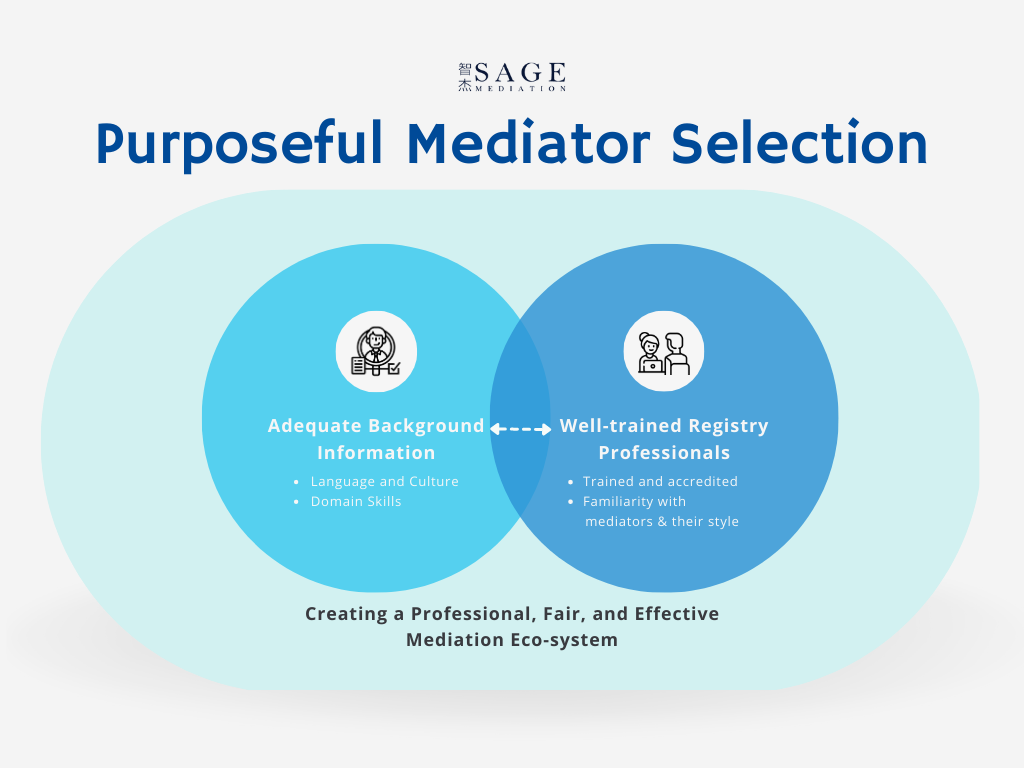
Mediators are as diverse as all human professionals. Each one’s mediation strategy is honed by a variety factors such as their training, background, and beliefs. The right mediator increases parties’ chances of achieving progress and closure during mediation.
Not many parties are aware that they can choose their mediator. Those that do have also been uncertain on what is the best way to decide. Beyond the mediator’s absence of any conflict of interest, there is a host of other factors that can influence the success of a mediation to different degrees.
Aggravating the difficulty of mediator selection is the concern that the other parties in the dispute would object to any proposed mediator. If Party A proposes Mediator X, it must be because they have some underlying relationship. Better hence for Party B to propose Mediator Y. But of course, the same logic will apply and Party A will then disagree with the nomination of Mediator Y.
To overcome these early struggles in convening the mediation, many disputants entrust the mediator appointment to the discretion of the mediation centres.
What we have found from extensive client and mediator engagements around the world has been that successful matching essentially boils down to 2 factors: (1) adequate background information submitted by the users to the registry, and (2) a professional and well-trained registry team.
What is Adequate Background Information?
Two of the most important pieces of information that enable successful matching of the mediator are (1) language and culture, and (2) domain skills.
- Language and Culture:
Mediators who are able to communicate in the parties’ language and appreciate their cultural context can create a safe and respectful environment for the mediation. In one family dispute, the mediator spoke to an elderly client in a local Hindi dialect and was immediately able to reduce the anxiety that the client felt. Familiarity with the nuances of the cultural context meant that the mediator could be sensitive to nuances in the indirect communication. These helped her to address underlying concerns and move parties to commit to a settlement.
- Domain Expertise:
The mediator’s familiarity with the jargon and internal processes in complex technical disputes can increase the efficiency of the mediation. They can more easily empathise with the parties, ask the right questions, and help the parties find common ground. For example, during medical disputes, doctor-mediators are often able to explain to patients and family members the decision-making process for hospital teams and at the same time assure the clinicians that there is appreciation of the challenges in their daily work. Parties who work with a mediator with the right expertise are also generally more confident that the mediated outcome is appropriately tailored to their unique situation.
There have, however, also been complaints that mediators who are subject matter experts often stray into “investigative mediation” and provide unsolicited views on the merits of party proposals. Clients and mediation advocates should hence make clear to the mediators at the pre-mediation meetings the extent to which they would like the mediator to offer his views on proposed outcomes.
There is no avoiding the logistical realities of the parties’ own availability and budget when it comes to mediator selection. While many parties are ready to wait for their preferred mediator, there are also many instances when the precise benefit of mediation is because time is of the essence. Knowing two or three dates of the parties’ common availability can help the registry shortlist the mediator candidates.
Parties should also be ready to confide to the registry if any of them face real financial constraints. There are many mediators who are privately prepared to assist disadvantaged clients and the registry can help to make the appropriate connections.
Well-trained Registry Professionals
For clients already mired in a protracted dispute, setting up the mediation can feel stressful. Mediation registry staff who are trained and accredited as mediators can help alleviate a lot of these anxieties.
As case managers, they can walk clients through the mediation process, assist them in assessing the suitability of mediation, and guide them in the submission of mediation documents.
Clients can leverage on the staff’s familiarity with different mediators and mediation styles to increase the chances of a satisfactory matching of mediators to the dispute.
For cross-border disputes, the registry can also direct disputants to mediators with the right professional certification to ensure that the mediated outcome will be enforceable under the Singapore Convention on Mediation.
Creating a Professional, Fair, and Effective Mediation Eco-system
For mediation to continue to gain traction in the community, users and service providers must work in tandem. Choosing the right mediator is an important first step in ensuring a fair and effective mediation process. Registry staff should regularly update their familiarity with mediation practice trends and clients should be ready to exercise their minds to decode what they believe will be most mutually acceptable to achieve an amicable resolution.



